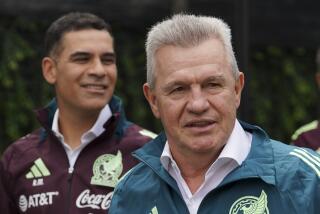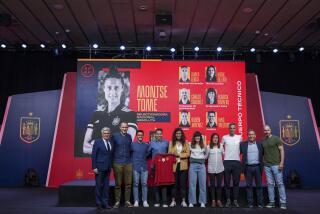Germany’s Joachim Loew is the coach to beat
- Share via
From Cape Town, South Africa — It is one of the most exclusive clubs in all of sports, with a membership of only 17 men.
The number would have been 18, but Italy’s legendary Vittorio Pozzo had the temerity — some would say the good luck — to win the World Cup twice during the 1930s.
That means there are only 17 coaches — nine of whom are still alive — who have led a team to soccer’s ultimate prize.
By Sunday night, there will be 18. But whether the latest to be admitted to the club will be Spaniard Vicente del Bosque, German Joachim Loew, Uruguayan Oscar Tabarez or Dutchman Bert van Marwijk is up for debate.
Based simply on how their respective teams have played at South Africa 2010, it deserves to be Loew, closely followed by Van Marwijk.
It could well be Del Bosque, and that would be deserved too, but it almost certainly will not be Tabarez.
The case for each:
German soccer is in its ascendancy, its revival spurred by Loew’s willingness, indeed commitment, to introduce young players, including those from varied ethnic backgrounds, into the Mannschaft. The new-look Germany is a bit of Bastian Schweinsteiger and a dash of Mesut Oezil. It is an exciting mix.
Meanwhile, the Dutch, under Van Marwijk, have, for a blessed change, not been reduced to squabbling and fighting among themselves. Despite the inventiveness of Wesley Sneijder and the liveliness of Arjen Robben, the team does not play the spectacular soccer of the 1970s, but a more down-to-earth variety. It could bring the reward that eluded earlier Oranje sides.
The Spanish have been something of a mystery. Del Bosque’s team is filled with more talent than any other at the World Cup, but it has been stuck in low gear. Its play has been treacle-slow. The intricate passing is there, but the speed is not. Forward Fernando Torres has been a bust, and were it not for striker David Villa and his tournament-high five goals, the Spanish would long ago have vanished.
That leaves the Uruguayans. In many ways, they are fortunate even to be in the final four, Ghana having let them off a very sharp and pointed hook in a quarterfinal. Diego Forlan has reminded everyone why he is one of the top finishers in the world, even at 31, but the sense is that the South Americans have gone as far as they can.
On Tuesday night in Cape Town, the Netherlands should, in theory, send Uruguay home. On Wednesday night in Durban, Germany should, in theory, do the same to Spain.
But the X-factor is the coaching. The figure on the sideline and the decisions he makes could well be the difference between a trip to Sunday’s final in Johannesburg and an earlier trip to the airport.
Tabarez, 63, is the oldest of the four. Loew, 50, is the youngest.
Del Bosque, 59, is the odd one out. Unlike the other three, he has a cabinet full of coaching silverware, with seven cups or titles won from 2000 to 2003, all of them with Real Madrid.
He also had the most glittering playing career of the four, winning five Spanish championships and four Spanish Cups as a defender for Real Madrid and playing 18 times for Spain.
He cuts a grandfatherly figure on the sideline but has been a bit gruff during this tournament because Spain, for all its talent, has not yet hit full stride. Wednesday would be a good time to do so.
Loew won the German Cup with VfB Stuttgart in 1997 and the Austrian championship with FC Tirol in 2002. Of the four, he has come closest to winning the World Cup when he served as an understudy to Juergen Klinsmann in 2006 and Germany finished third.
Van Marwijk, 58, won the UEFA Cup with Feyenoord in 2002 and the Dutch Cup with the same club in 2008. Before taking the Dutch on an unbeaten run through qualifying and on their current dizzy run, he had done little to suggest World Cup success was possible.
Tabarez, who won the Copa Libertadores with Peñarol in 1987, is the shrewdest of the bunch. A master tactician, he is a onetime schoolteacher — hence his nickname, El Maestro. He is also an admirer of Ernesto “Che” Guevara, and went so far as to name his daughter Tania after the revolutionary leader’s female sidekick.
A coach for 30 years in his native Uruguay and in Colombia, Argentina, Italy and Spain, Tabarez is probably the most flexible in terms of changing strategy and formations to foil an opponent.
“The Uruguayans are like a chameleon in the way they play,” said Marcel Desailly, a 1998 World Cup winner for France.
But it will take more than a change of color to see them through to the final.






